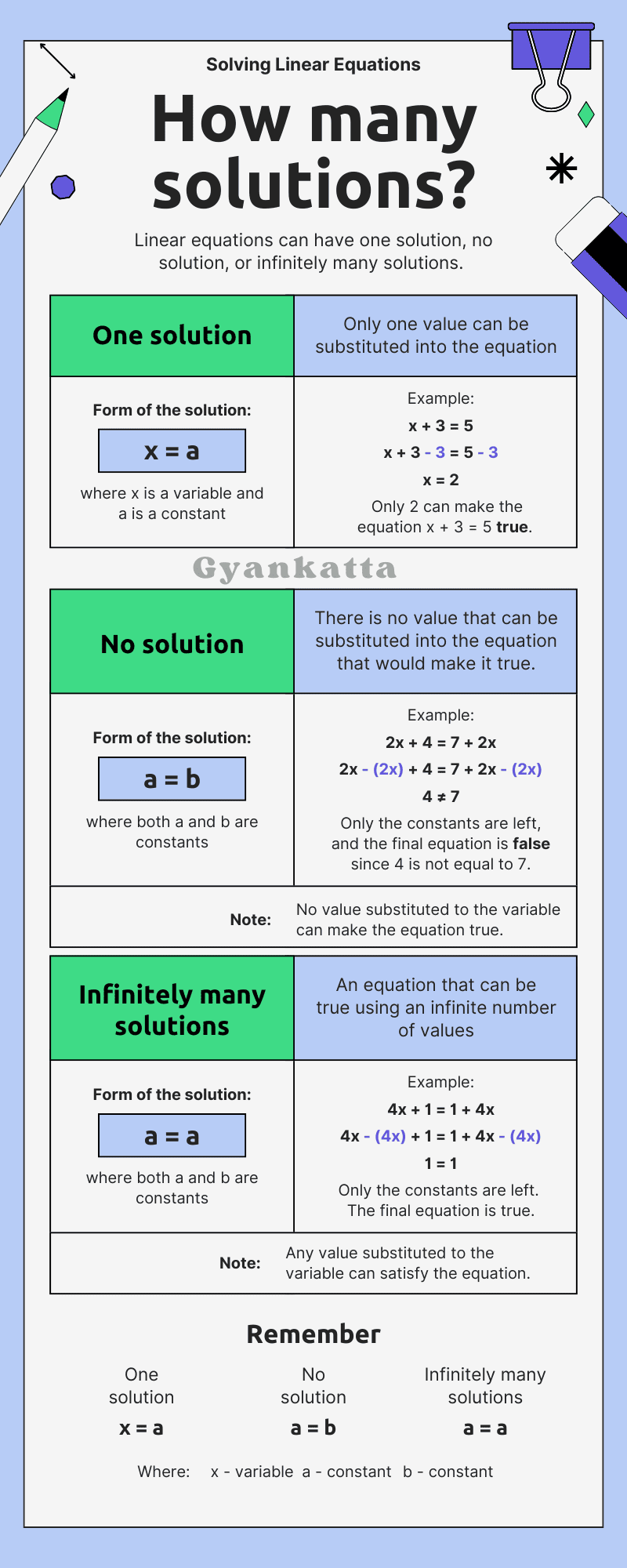Class 8 Math Linear Equations in One Variable Notes
Linear Equations in One Variable – Class 8
Hi everyone! This chapter is about Linear Equations in One Variable. These are like puzzles where we need to find a missing number.

What are Linear Equations?
A linear equation is an equation where the highest power of the variable (usually ‘x’) is 1. It’s like a straight line when you graph it (that’s why it’s called “linear”). It has an equals sign (=).
Examples: 2x + 3 = 7, 5y – 2 = 13, z/2 + 1 = 4
Non-Examples: x² + 2 = 5 (x has a power of 2), 1/x = 3 (x is in the denominator)
Solving Linear Equations
Solving a linear equation means finding the value of the variable that makes the equation true. We do this by isolating the variable on one side of the equals sign.
Steps to Solve:
- Simplify both sides of the equation by combining like terms.
- Use inverse operations to move terms to the correct side. Remember:
- To undo addition, subtract.
- To undo subtraction, add.
- To undo multiplication, divide.
- To undo division, multiply.
- Check your answer by plugging it back into the original equation.
Solve: 3x – 5 = 10
- Add 5 to both sides: 3x – 5 + 5 = 10 + 5 => 3x = 15
- Divide both sides by 3: 3x / 3 = 15 / 3 => x = 5
- Check: 3(5) – 5 = 15 – 5 = 10 (It works!)
Applications of Linear Equations
Linear equations are used to solve many real-world problems. Here are some examples:
1. Age Problems:
Example: Rohan is 5 years older than his brother. In 3 years, Rohan will be twice as old as his brother. How old are they now?
Solution: Let the brother’s current age be ‘x’. Rohan’s current age is ‘x + 5’. In 3 years, the brother will be ‘x + 3’ and Rohan will be ‘x + 5 + 3’ or ‘x + 8’. The equation is: x + 8 = 2(x + 3). Solving this gives x = 2 (brother’s age). Rohan’s age is 2 + 5 = 7.
2. Word Problems (Numbers):
Example: The sum of two numbers is 25. One number is 7 more than the other. Find the numbers.
Solution: Let one number be ‘x’. The other number is ‘x + 7’. The equation is: x + (x + 7) = 25. Solving this gives x = 9 (one number). The other number is 9 + 7 = 16.
3. Geometry Problems:
Example: The length of a rectangle is 3 times its width. If the perimeter is 48 cm, find the length and width.
Solution: Let the width be ‘w’. The length is ‘3w’. The perimeter is 2(length + width) = 2(3w + w) = 8w. The equation is: 8w = 48. Solving this gives w = 6 (width). The length is 3 * 6 = 18.
Practice solving lots of equations, and you’ll become a pro!
Linear Equations Quiz – Application Problems
1. Age Problem: A father is three times as old as his son. In 12 years, the father will be twice as old as his son. How old are they now?
2. Number Problem: The sum of two consecutive even integers is 78. Find the integers.
3. Geometry Problem: The length of a rectangle is 5 cm more than its width. If the perimeter is 38 cm, find the length and width.
4. Money Problem: A person has 20 notes consisting of Rs. 10 and Rs. 50 denominations. If the total amount of money is Rs. 580, how many notes of each type are there?
5. Speed Problem: A car travels at a speed of 60 km/h for a certain time. If it had traveled at a speed of 70 km/h, it would have covered 50 km more in the same time. Find the distance traveled by the car.
6. Mixture Problem: A shopkeeper mixes two types of rice costing Rs. 30 per kg and Rs. 50 per kg in the ratio 2:3. If the selling price of the mixed variety is Rs. 40 per kg, find the cost price of the mixed variety.
7. Work Problem: A can do a piece of work in 10 days and B can do it in 15 days. How many days will they take to complete the work together?
8. Investment Problem: A person invests a sum of Rs. 8000 partly at 5% per annum and the remaining at 6% per annum simple interest. If the total interest earned after 3 years is Rs. 1260, find the amount invested at 6% per annum.
9. Shopping Problem: Rohan bought 3 notebooks and 2 pens for Rs. 80. Each notebook costs Rs. 10 more than a pen. What is the cost of one notebook?
10. Distance-Time Problem: A train travels a distance of 300 km at a uniform speed. If the speed had been 5 km/hr more, it would have taken 2 hours less for the same journey. Find the speed of the train.


